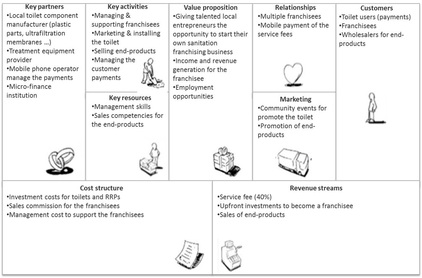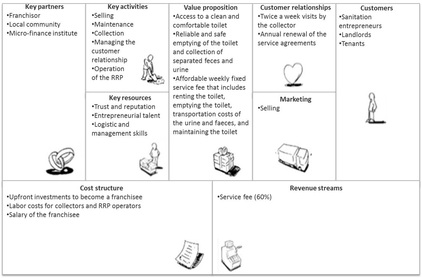Sanitation Business Model
The Blue Diversion Toilet was developed in conjunction with a business model, which highlights a potential pathway for commercialization on a larger scale. The business model covers all activities along the sanitation value chain. Upstream in the sanitation chain, it structures the marketing, sales, operation and maintenance of the Blue Diversion Toilet. Downstream in the sanitation chain, the business model highlights the collection of urine and faeces, their transport to the off-site resource recovery plants, and the production and sale of marketable fertilizer end products.
Our business model relies on a franchising approach. We envision that an established private or public organization will act as a franchisor. Local entrepreneurs will have the business opportunity to become franchisees. Franchising is a proven concept, and allows for a cost efficient and timely scaling up of the sanitation services. Our model also highlights the many small business and entrepreneurial talents that already exist in low-income countries. Many talented entrepreneurs will be able to become franchisees. This provides for a strong and dedicated sales approach that will help convince sanitation entrepreneurs, landlords, and tenant households to enter rental agreements for the Blue Diversion Toilet. The business model will become financially sustainable at a certain scale and after our cost targets are reached.
Our business model relies on a franchising approach. We envision that an established private or public organization will act as a franchisor. Local entrepreneurs will have the business opportunity to become franchisees. Franchising is a proven concept, and allows for a cost efficient and timely scaling up of the sanitation services. Our model also highlights the many small business and entrepreneurial talents that already exist in low-income countries. Many talented entrepreneurs will be able to become franchisees. This provides for a strong and dedicated sales approach that will help convince sanitation entrepreneurs, landlords, and tenant households to enter rental agreements for the Blue Diversion Toilet. The business model will become financially sustainable at a certain scale and after our cost targets are reached.
Animation explaining the business model
The franchisor is responsible for branding, promotion, assembling, and installation of the toilet, the collection of the weekly service fees, procurement and installation of the treatment technology, as well as branding and marketing the end products.
Franchisees sell the toilet service agreements to sanitation entrepreneurs, landlords, and tenant households, collect the urine and faeces and operate the RRPs.
Franchisees sell the toilet service agreements to sanitation entrepreneurs, landlords, and tenant households, collect the urine and faeces and operate the RRPs.
A business case was calculated for a business serving 17200 users (20 RRPs) in Kampala, Uganda, accounting for logistic costs of $0.01 per person and day, prices for all technical elements, assuming mass production, and revenue from fertilisers amounting to $0.02 per user and day. The results reveal that the total cost of $0.05 incurred by the user per day is a realistic and achievable goal. And the business is still profitable.
Learn more about the price schemes for the different market segments...
Learn more about the logistic costs...
Learn more about the price schemes for the different market segments...
Learn more about the logistic costs...



